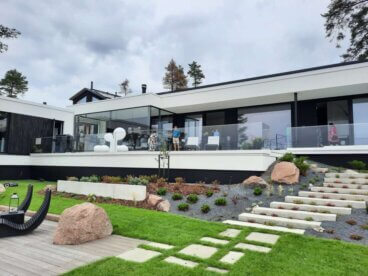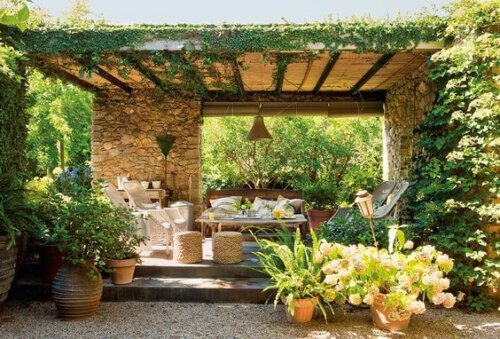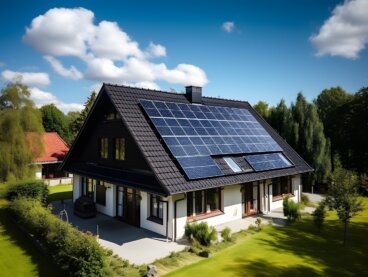Choosing the Right Kitchen Counter
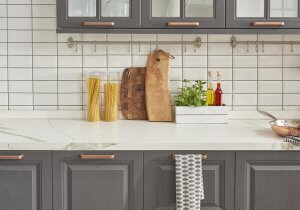
In kitchens, counters aren’t just essential for practical purposes; they’re an important decor element, too. Choose your kitchen counters carefully.
Your ultimate choice will depend on your personal preferences, kitchen style, and how much time you’ll put into cleaning and maintenance. We’ll fill you in below!
What factors should you consider when looking for a kitchen counter?
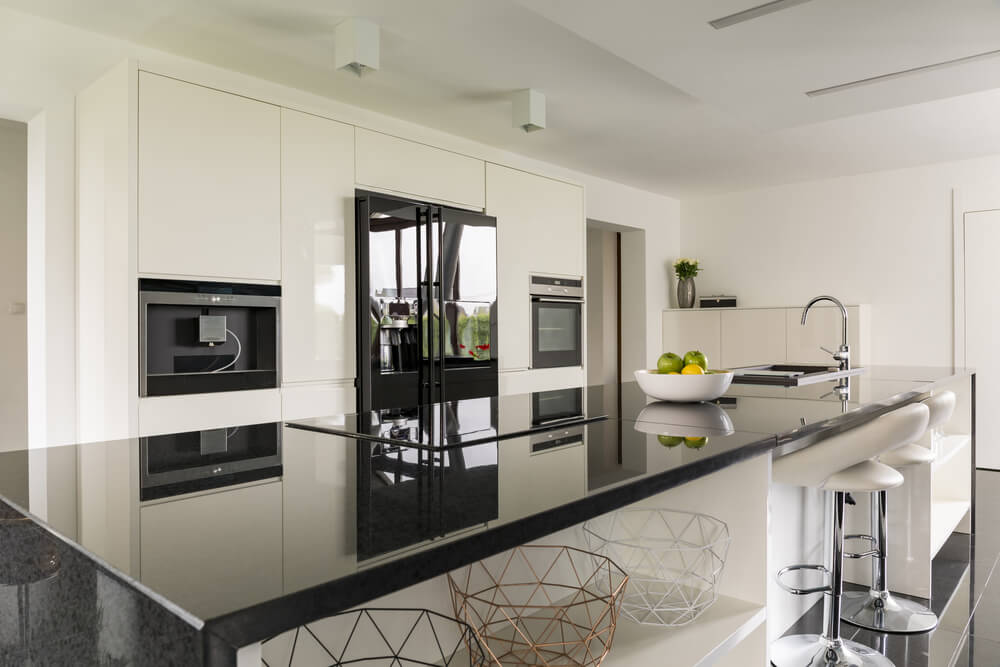
Choosing kitchen counters isn’t a task that you should take lightly…it can get complicated! The right choice lies between design and aesthetics as well as budget and future use.
The right counters should be resistant to temperature changes and weight. It should also fit into your kitchen decor.
A rustic kitchen isn’t the same thing as a modern one. Before you buy counters, make sure you’ve thought about these important factors.
- Will you take the time to clean and maintain them or would you prefer a low-maintenance option?
- Are you looking for counters that don’t show fingerprints or scratches or do you prefer one that can withstand high temperatures?
- Do you use the oven often or do you cook with foods that stain or spill juice?
- Do you lean more towards design or practicality?
The last question is really something to think about. When people look for kitchen counters, many base their decision on decor and color because they don’t cook often. On the other hand, those who cook daily look for durability and practicality.
If you have children, we suggest using an easy-to-clean material that doesn’t require much maintenance like laminate counters.
Before making any purchases, think about your expectations for properties and durability. Choose a material that fits your style and preferences. Remember kitchen counters are basically for the long-term and they should adapt to your current and future lifestyle.
Types of kitchen counters
A good way of making the right choice is by looking at all of the options that you have available. While it might seem tedious, that’s not the case at all. Experts recommend touching counters before making a decision. But why? Because touch will tell you more than sight does!
If you go to a store with no idea about kitchen counters, you might have a harder time choosing. So, we recommend knowing at least the basic properties of each material.
1. Laminate
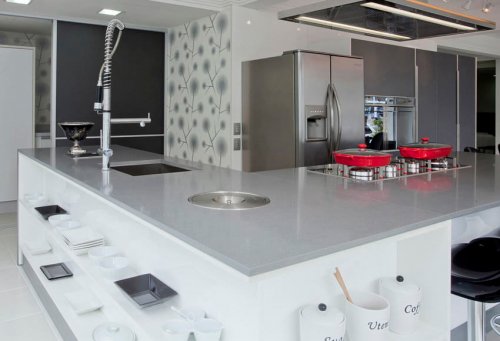
Laminate counters are solid bases that are covered with plastic material. Today, you can find finishes in many different colors and designs; so much so that you could almost consider it personalizable.
However, dampness can occur if they’re not installed correctly. You have to make sure that water doesn’t collect in the areas where they connect to cabinets or walls. But they have a great quality-price ratio.
2. Wood

Wood is undoubtedly the most beautiful option, but it requires special maintenance: varnishing, brushing, and sanding every once in a while.
Wooden counters are more vulnerable to humidity, stain more easily, and damage easily from impact or cuts. They’re also not very economical because you need to buy thicker pieces for a lasting result.
3. Quartz
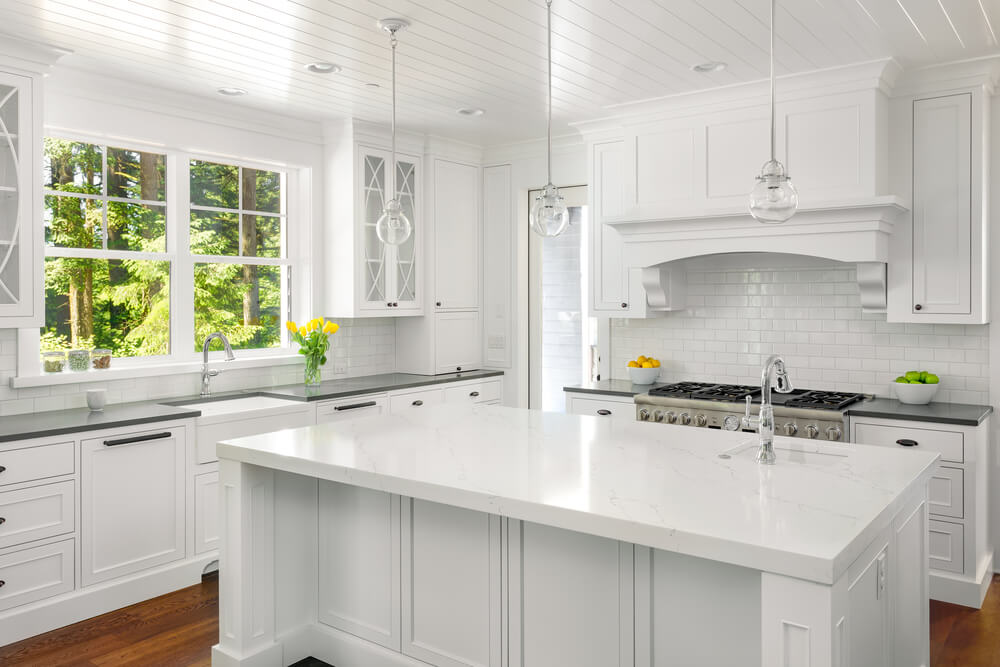
These counters are a mix of natural quartz and polyester resin. The resulting product is a counter that’s strong, resilient, easy-to-clean, and available in many colors.
4. Marble or granite
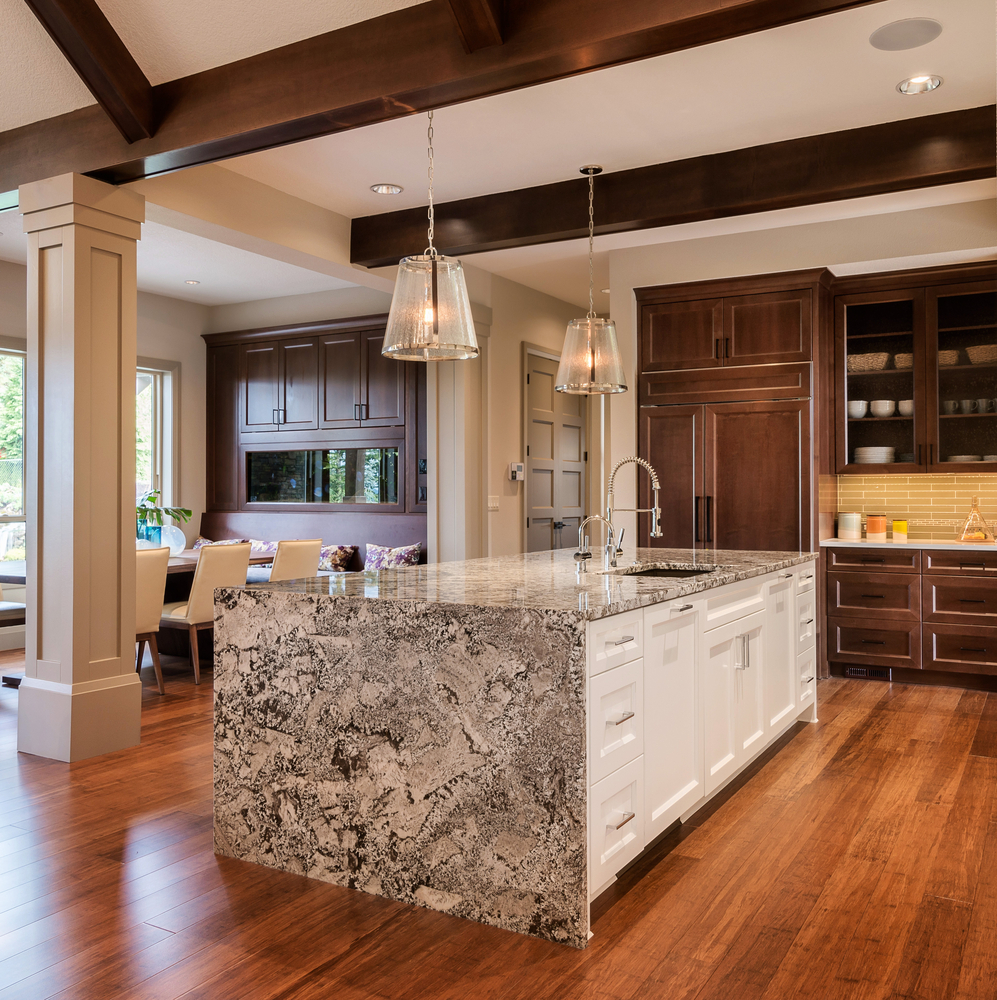
Stone is a popular element for kitchen counters. Their best qualities are that they’re durable and long-lasting.
While grays or blacks are favorites, you can find them in different colors. They can have a polished (smooth) or flamed (rough) finish. These materials are also very easy to clean.
But marble counters are very heavy and difficult to transport or handle. If you have an L-shaped kitchen, you’ll most likely need to buy two separate pieces and connect them.
You can also opt for a stainless steel kitchen counter, which will last forever. Stainless steel withstands impact, high temperatures, and humidity.
In kitchens, counters aren’t just essential for practical purposes; they’re an important decor element, too. Choose your kitchen counters carefully.
Your ultimate choice will depend on your personal preferences, kitchen style, and how much time you’ll put into cleaning and maintenance. We’ll fill you in below!
What factors should you consider when looking for a kitchen counter?

Choosing kitchen counters isn’t a task that you should take lightly…it can get complicated! The right choice lies between design and aesthetics as well as budget and future use.
The right counters should be resistant to temperature changes and weight. It should also fit into your kitchen decor.
A rustic kitchen isn’t the same thing as a modern one. Before you buy counters, make sure you’ve thought about these important factors.
- Will you take the time to clean and maintain them or would you prefer a low-maintenance option?
- Are you looking for counters that don’t show fingerprints or scratches or do you prefer one that can withstand high temperatures?
- Do you use the oven often or do you cook with foods that stain or spill juice?
- Do you lean more towards design or practicality?
The last question is really something to think about. When people look for kitchen counters, many base their decision on decor and color because they don’t cook often. On the other hand, those who cook daily look for durability and practicality.
If you have children, we suggest using an easy-to-clean material that doesn’t require much maintenance like laminate counters.
Before making any purchases, think about your expectations for properties and durability. Choose a material that fits your style and preferences. Remember kitchen counters are basically for the long-term and they should adapt to your current and future lifestyle.
Types of kitchen counters
A good way of making the right choice is by looking at all of the options that you have available. While it might seem tedious, that’s not the case at all. Experts recommend touching counters before making a decision. But why? Because touch will tell you more than sight does!
If you go to a store with no idea about kitchen counters, you might have a harder time choosing. So, we recommend knowing at least the basic properties of each material.
1. Laminate

Laminate counters are solid bases that are covered with plastic material. Today, you can find finishes in many different colors and designs; so much so that you could almost consider it personalizable.
However, dampness can occur if they’re not installed correctly. You have to make sure that water doesn’t collect in the areas where they connect to cabinets or walls. But they have a great quality-price ratio.
2. Wood

Wood is undoubtedly the most beautiful option, but it requires special maintenance: varnishing, brushing, and sanding every once in a while.
Wooden counters are more vulnerable to humidity, stain more easily, and damage easily from impact or cuts. They’re also not very economical because you need to buy thicker pieces for a lasting result.
3. Quartz

These counters are a mix of natural quartz and polyester resin. The resulting product is a counter that’s strong, resilient, easy-to-clean, and available in many colors.
4. Marble or granite

Stone is a popular element for kitchen counters. Their best qualities are that they’re durable and long-lasting.
While grays or blacks are favorites, you can find them in different colors. They can have a polished (smooth) or flamed (rough) finish. These materials are also very easy to clean.
But marble counters are very heavy and difficult to transport or handle. If you have an L-shaped kitchen, you’ll most likely need to buy two separate pieces and connect them.
You can also opt for a stainless steel kitchen counter, which will last forever. Stainless steel withstands impact, high temperatures, and humidity.


